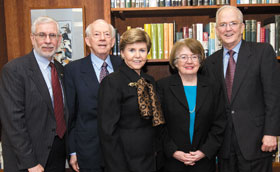  |
| HOME | THIS ISSUE | CALENDAR | GRANTS | BACK ISSUES | < BACK | NEXT > |
Women's basic rights ignored in many countries, says speaker by Sherry Fisher - March 17, 2008 |
||||
| Despite widespread acceptance of treaties and declarations that bar discrimination based on gender, “women’s most basic rights – the right to work, to own property, and to make choices on family status and reproduction – have been subordinated in too many parts of the world that dictate subservience to husbands, fathers, brothers, even in-laws,” Patricia Wald says. Wald, who was U.S. Judge on the International Criminal Tribunal for the Former Yugoslavia at The Hague starting in 1999, gave the 14th annual Raymond and Beverly Sackler Distinguished Lecture in Human Rights at the Thomas J. Dodd Research Center on March 3. She discussed “Perplexing Predicaments in Human Rights Law: Women, Terror, and Tribunals.” The war crimes tribunals and international humanitarian law jurisprudence brought some women’s rights to center stage as enforceable mandates of international law, she said. But in some places “women’s rights have fallen prey to the supremacy of male power in family relationships, enforced by religious or tribal courts purporting to follow customary law,” she said, noting that women in many countries in the Middle East and in Asia are denied the rights to be educated or to work in occupations outside the home. Wald, who was born in Torrington and earned degrees from Connecticut College and Yale Law School, recently participated in a U.S.-based training course for the first group of 31 women ever appointed as judges in Egypt. “We gave them the standard instruction in our gender discrimination laws and practices here in the U.S.,” she said, “and on the requirements of the commission to end discrimination against women, a treaty which Egypt, interestingly, has ratified and the U.S. has not. But their principal questions to us were in the realm of whether women here could inherit money and own property, get divorces, and get custody of children.” She said the Egyptian female judges didn’t have offices as such; they would hear cases in courthouses, then return home to work on the judgments. Nonetheless, she said, “their mere appointment was hailed as a monumental advance for women in Egypt.” Becoming a judge “may not qualify in everybody’s vocabulary as a human right, vital to an individual’s existence,” Wald said, “but the Egyptian situation does point out one of the strongest reasons why women in so many parts of the world have such a hard time gaining access to fundamental human rights, however defined.” She noted that some people claim gender-blind rights included in treaties and international declarations “are themselves too antiseptic, and ignore the binding realities of cultural and religious mores that dominate the lives of women outside the West.”
Such critics describe the scope of rights defined in these documents as not truly universal, but rather derived from Western Anglo-Christian and Judaic cultures, and say they don’t fit the lifestyles of ordinary women in countries such as Afghanistan, Cambodia, or Central Africa. Wald said a series of global women’s and human rights conferences held around the world in the 1990s sought to “rend the veil of iron between the public pieties and the private realities of women in those countries, and to elevate interfamilial abuses of women to full-fledged human rights violations.” But, she said, “the progress in that struggle is slow and erratic.” Reform will have to “emanate from within [each] society itself, slowly, and most likely issue by issue,” Wald said. While the female judges in Egypt may not be able alone to change discriminatory laws, she said, at some point they may feel confident enough to speak out against them and, when there is a sound basis, interpret them in a way that affords women more leeway and choices. “The structural inequality that characterizes a government of men will never be addressed effectively by treaties or declarations interpreted and administered exclusively by men,” she added. Wald, who served on the U.S. Court of Appeals for the District of Columbia Circuit for two decades, encouraged international human rights groups to continue to “press for governmental recognition of accepted universal rights for women,” and not to accept the incorporation of religious law into the national legal system.” She also said that international development and loan agencies and private companies need to be “more aggressive in making their assistance to countries conditional on women’s equal access to employment, education, and other essential opportunities.” |
| ADVANCE HOME UCONN HOME |

